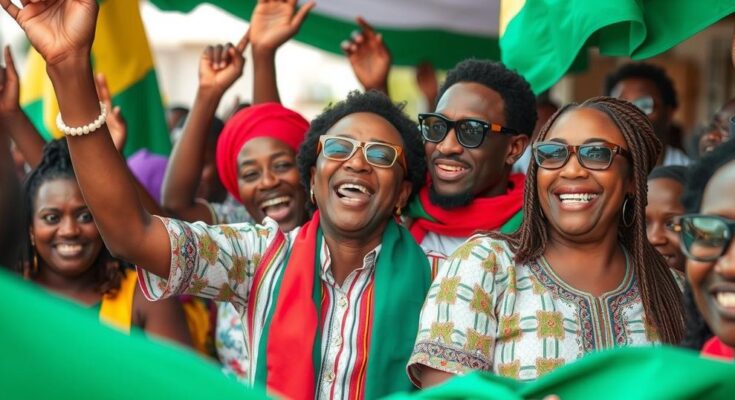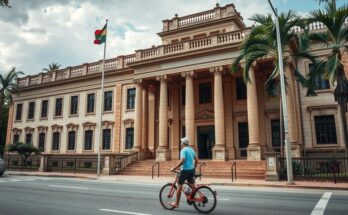The opposition NDC in Ghana claims provisional election results indicate John Mahama won with 56.3% against Bawumia’s 41.3%. The election focused on economic issues amidst a backdrop of dissatisfaction with government performance. Official results are still pending, with the electoral commission expected to announce them by Tuesday, while recent violence raised concerns over the election’s safety.
On Sunday, the opposition party in Ghana, the National Democratic Congress (NDC), claimed that provisional results from the recent presidential election indicated that its candidate, John Mahama, had secured victory. However, the electoral authorities emphasized that official tallies were still being compiled. The election featured a competition primarily between Mahama and the ruling New Patriotic Party’s (NPP) candidate, Vice President Mahamudu Bawumia, who attempted to distance himself from dissatisfaction regarding government policies and the rising cost of living.
The election was heavily influenced by the ongoing challenges facing Ghana’s economy, which has experienced issues such as debt default, currency devaluation, and rampant inflation. These economic difficulties had culminated in a $3 billion bailout from the International Monetary Fund (IMF). Voters were selecting a successor to President Nana Akufo-Addo, who is concluding his tenure after serving the maximum two four-year terms.
According to Sammy Gyamfi, a spokesperson for the NDC, the party’s internal assessment revealed that Mahama received 56.3 percent of the votes, while Bawumia garnered 41.3 percent. Gyamfi proclaimed, “It is very clear the people of this country have voted for change.” Local broadcaster ChannelOne TV corroborated this claim, reporting that preliminary results from 42 out of the 276 constituencies suggested Mahama was leading.
Despite the NDC’s assertions, the Deputy Commissioner of the Electoral Commission, Bossman Asare, informed the press that the counting process was still underway and that regional results had not yet been transmitted to the national headquarters. The Commission has indicated that official results are anticipated by Tuesday. Bawumia was also expected to address the media on Sunday.
The election proceeded largely without significant disturbances, though reports indicated that one individual was shot dead in the northern region and another in the central region. Ghana has a well-established reputation for democratic governance, with the NPP and NDC alternating control since 1992.
Bawumia adopted the campaign slogan “Break the 8,” aiming to secure an unprecedented third consecutive term for the NPP. However, he encountered challenges stemming from public criticism of Akufo-Addo’s economic policy record. Although inflation had notably decreased from over 50 percent to approximately 23 percent, economic issues remained pivotal in influencing the electorate’s decisions, paving the way for Mahama’s resurgence, following his unsuccessful attempts at the presidency in previous elections.
The imminent presidential election in Ghana attracted considerable attention due to the economic turmoil the country has faced in recent years. This turmoil included a debt crisis and inflation, which became central topics during the election campaign. With Nana Akufo-Addo stepping down after two terms, the contest was keenly observed as either the NDC or the NPP could reshape Ghana’s economic and political landscape. Political analysts were particularly interested in how voters would respond to the NPP’s handling of the economy, especially given the backdrop of an IMF bailout and public dissatisfaction. John Mahama, having previously served as president, represented the NDC and sought to capitalize on the current administration’s struggles. His campaign focused on leveraging the electorate’s calls for change amid high living costs and economic distress, presenting him as a transformative leader. In contrast, Vice President Mahamudu Bawumia represented the NPP and attempted to promote continuity and stability, but faced significant obstacles arising from the incumbent government’s record. The political milieu thus set the stage for a highly competitive election where each candidate sought to articulate their vision for Ghana’s recovery and future growth.
In conclusion, the claims by the NDC regarding John Mahama’s lead in the presidential election reflect a significant shift in the political sentiment of the Ghanaian electorate amid ongoing economic concerns. As official results are still pending from the Electoral Commission, it remains to be seen how this election will reshape the political landscape in Ghana. The broader implications of the economic struggles and voter dissatisfaction may lead to a defining moment in the nation’s governance and policy direction in the coming years. The contrasting visions of Mahama and Bawumia will be crucial as Ghana navigates its current challenges.
Original Source: themercury.com




